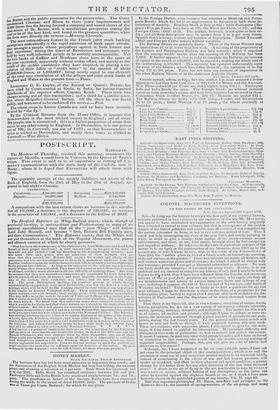The Hertford Reformer (a Whig-Radical paper, which, though of provincial
locality, is metropolitan and Parliamentary in many of its political speculations,) says that all the " pure Whigs" will follow Lord John Russell, and become " first, Reform Bill Finality men, and then Conservatives." The Reformer regrets that the Whigs will not put themselves at the head of the Popular Movement, the power and ultimate success of which he clearly perceives.
••What hasbeen the consequence of the abdication by Lord Melbourne and Lord John Russell of their proper functions? A wild, onward rush, on the part of the mass or those who are now excluded from the franchise in the manufacturing districts.—men who know their own power, who are conscious of their strength, vs ho are aware that they carried the Reform Bill agairod the wishes and efforts of the aristocracy, and who are determined not to ;Wow their permanent exclusion from the franchise, conferred upon the middle classes by that bil1,10 he Made a matter of principle by the present Government. As long as the extension of the suffrage was a question Merely of time, they were contented. They knew that sooner or later, their objects would he attained. and they made allowances for the difficulty of realizing them. But from the moment that they saw themselves contumeliously repudiated by Lord John Rog. !ell's ill-starred, M.:advised, ill omened, and most impolitic declaration at the begin. Mug of the session, their resolution was taken ; and we now see the fruits of it. The great Birmingham meeting. the numbers present at which, though unquestionably exaggerated, were most fooltnidable, was but the first of a series of meetings which will he held by the working classes in every town of any importance in the empire to demand Universal Suffrage. Their organization is perfect ; their objects distinct, anti well defined ; their energy great; their unanimity unexampled. They may differ as to the uses to be.neade of Universal Suffrage when carried, jest its men of every class differ in opinion upon important social questions. They may expect too much from it. We know that they entertain many must mistaken notions as to that it would do for them, and that these notions are fostered by the crude absurdities of their leaders. lint they will pursue the common object with tenacious persevera nee, MI agitate it unceasingly, moil it end in a second Rennin Bill, approximating greatly to the principles laid down in what is now called the National Charter. The Binning. ham meeting has been already bellowed by similar displays of the power of the masses, at Leeds, Ipswich, Aberdeen, Glasgow, and many other places. There is to be a de- monstratiou of the same knot upon a very formidable scale in London, in the course of the Autumn; and, before Parliament meets, we hays little doubt .that 590M10 signa- tures wiil be affixed to w hat is termed the National Petition. • • • • • A bad harvest —a period of commercial distress—or the acquisition by the Universal Suffrage men of some known and formid dile leader, in lieu of the Attwoods anti the Feargus O'Connors, who now disgrace them by their rhapsodies—any one of these things might precipitate a struggle, the issue of which it is impossible to calculate. Lord Brougham's jonetion with the Working Men's Association, which we think neither impossible nor improbable. (and we beg our readers to mink the prediction,) might exercise the must singular influence upon tine destinies of the nation. Ile goes to Glasgow iu the Autumn : what he will do there, let those who can, prophecy."


























 Previous page
Previous page